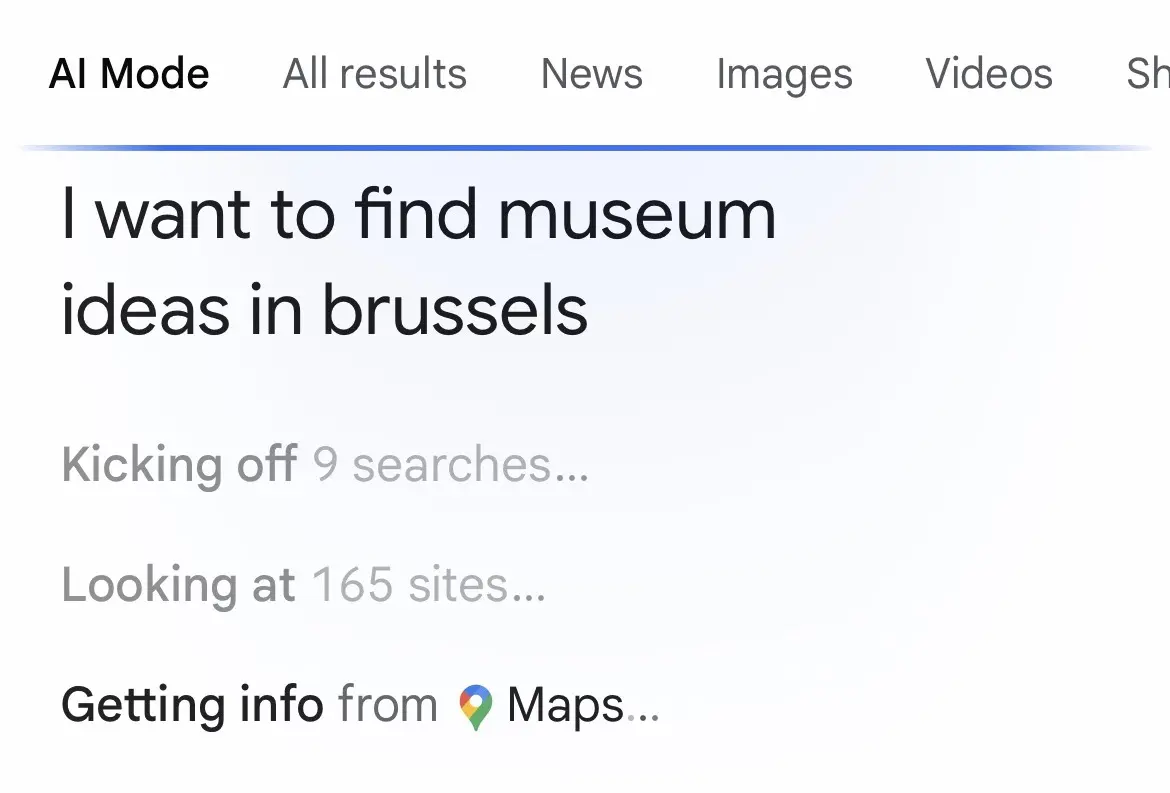Everything you need to know about Google's AI Mode and its impact 🤖
🧠 AI Mode, the next revolution?
Google I/O 2025 took place on May 20, 2025. Google’s annual keynote is an opportunity for the Mountain View firm to present all its new features (and to pat itself on the back 🌷). It was also an opportunity for Google to reaffirm its mastery of generative AI and Search. As part of this presentation, they officially launched AI Mode in the United States, a feature they seem to consider “the next big thing.”
“AI will be the most powerful engine for discovery that the web has ever seen.”
But how could this new feature revolutionize Search, and therefore… your digital strategy?
What is Google’s AI Mode?
Already accessible in beta for several weeks and officially launched at the end of Google I/O 2025, AI Mode is the latest tech that blends Search & Generative A.I. While AI Overviews were barely mentioned during the Google conference, AI Mode was in the spotlight, giving us a sense it might be its successor. It is a search experience entirely powered by generative artificial intelligence (Gemini 2.5), which synthesizes answers from multiple sources and enriches them with links. It handles increasingly longer, more precise, and more complex queries. Currently in alpha version, it will lack some advanced features mentioned in this presentation until summer 2025. As always with Google, no official release date is planned for our regions.
In summary, AI Mode offers AI-guided search, capable of handling complex requests while gathering and structuring information to provide a smoother and more relevant experience.
Need SEO support?
Universem guides you in optimizing for AI Mode.
How does AI Mode work?
The technical core of AI Mode relies on the technique called:
“query fan-out”
-
1Query decomposition
The Gemini model analyzes your question to extract multiple subtopics and intents (e.g.: actors, dates, numerical data). -
2Simultaneous queries
For each subtopic, Search launches in parallel traditional web searches, queries the Knowledge Graph, draws from the Shopping Graph, or consults real-time streams (weather, stock market, sports). -
3Aggregation and synthesis
The results are merged and filtered based on quality criteria, then synthesized by Gemini into a structured response: text, charts, maps, links. -
4Verification and enrichment
If any gaps remain, AI Mode triggers follow-up queries to fill in missing information and ensure accuracy and completeness.



What are its features?
In the coming months, Google’s AI Mode in Search will introduce some features that will set it apart more deeply from AI Overviews. Each one addresses a specific need, from data exploration to task automation. AI Mode also brings together many technologies developed by Google, Project Astra, Project Mariner, Imagen 4, … You can feel that Google wants to offer a more mature tool that aggregates all its capabilities to better serve its users (and to make a nice snub to OpenAI).
Data Visualization
How it works
When searching for numerical data (sports statistics, market trends), AI Mode automatically generates appropriate visualizations:
-
✓
Identification of the data type (timeline, comparison, distribution)
-
✓
Automatic selection of the format (bars, lines, areas, pie chart)
-
✓
Highlighting key points (peaks, trends, anomalies)
Example: To the question “Compare the evolution of the number of Apple smartphones sold compared to Android models,” AI Mode generates a comparative chart accompanied by a textual summary.
Importance
-
Your data, if accessible, can be used for certain answers
-
Conducting studies on your own site may have less impact in the future; however, being visible in such a result can remain interesting for awareness. The zero-click era is indeed here
Deep Search
In-depth search
For complex searches requiring in-depth analysis, Deep Search offers:
-
✓
Decomposition of the query into dozens or hundreds of sub-queries
-
✓
Aggregation of information from the web, academic databases, Knowledge Graph, and news
-
✓
Structured synthesis with integrated citations and references
Use case: For a search on the impacts of climate change on agriculture, Deep Search collects scientific studies, articles, and satellite data to generate a comprehensive report.
Importance
-
If Google is able to dig deep (without awakening a Balrog), we may see lesser-known sites appear that provide a perfect answer (the famous hidden gems), it might be a great opportunity for smaller players.
-
It feels like the Deep Search mode of Gemini 2.5 Pro is repurposed in a Search interface and that the intention is indeed to counter (or at least match) OpenAI’s deep research mode.
Personal Context
Personalized search
With your permission, AI Mode can use your personal context for tailored results:
-
✓
Integration of Gmail and Calendar data for relevant suggestions
-
✓
Utilization of Drive and Docs files to enrich responses
-
✓
Use of search history for targeted recommendations
Practical example: For a search on “activities in Nashville this weekend,” AI Mode can check your Gmail reservations and offer recommendations tailored to your stay dates and lodging location.
Importance
-
Until now, Search was not very personalized; this is a big change!
-
How to monitor and track visibility when the same search can yield different results?
-
An opportunity to write articles that will speak to its niche on topics that otherwise would not be relevant?
Search Live (real-time multimodal)
Live visual interaction
Based on Lens and Project Astra technologies, Search Live allows you to:
-
✓
Interact via voice while filming your environment
-
✓
Identify objects and scenes in real time
-
✓
Receive immediate contextual instructions
Demonstration: By pointing your phone at a drill and asking “Which bit to use for tiles?”, Search Live identifies the tool, recommends the appropriate bit type, and offers a short explanatory video.
Importance
-
Big paradigm shift from purely textual search to voice search
-
Explosion of search possibilities. Every content is content to optimize
-
Putting yourself in your users’ “shoes” has never been more critical
Agentic capabilities
Task automation
Thanks to Project Mariner and the MCP protocol, AI Mode can accomplish tasks such as:
-
✓
Booking event tickets and restaurant reservations
-
✓
Price monitoring and automated purchasing via Google Pay
-
✓
Form filling and handling administrative procedures
Use case: At the request “Find two affordable tickets for the Reds match on Saturday,” AI Mode compares ticketing sites, analyzes available options, and presents the best deals according to your criteria.
Importance
-
You may want to optimize a site at the UX level for a user, but also for an agent
-
Using accessible web technologies will be all the more critical
-
How to track an agent’s journey with current tools?
Product search and AI shopping
Smart shopping experience
AI Mode now integrates a Shopping partner:
-
✓
Visual inspiration: a personalized product image mosaic.
-
✓
Virtual try-on: trying on clothes in AR from a photo of the user.
-
✓
Agentic checkout: price tracking and automated purchase at a set threshold, always under control.
Use case: For a rug, the user sends a photo of their sofa, AI Mode suggests suitable models and can trigger the purchase as soon as the price drops below 50 euros.
Importance
-
Good structuring of product pages (structured data, high-quality images, advanced descriptions on usage types, material and color variants).
-
Will Google take the place of ecommerce category pages?
In summary
AI Mode represents a major evolution of Google Search, combining:
- •data visualization
- •in-depth search
- •personalization
- •visual interaction
- •automation
These features are being rolled out progressively, with a first availability in the United States and then a global rollout planned in the coming months.
What can you do to prepare your website for this change?
Preparing for the arrival of AI Mode
Even though no release date has yet been set for AI Mode in Europe and AI Overviews are still not live in French or Dutch in Belgium, it is still interesting to consider how best to prepare. Here are some useful points:
Structure and enrich your data
-
✓
Implement structured data (preferably JSON) for products, articles, and any other useful elements in order to be better understood. Google recently confirmed that they use structured data in their generative AI system.
-
✓
Depending on future developments, it will be useful not to limit yourself to the data provided by Google for rich displays. With queries that become longer and more specialized, mentioning every important element of an article (size, weight, material, color, …) could have an impact in search.
Produce expert content
-
✓
Create detailed guides, case studies, and downloadable reports (PDF, slides) that can be directly used in Deep Search summaries.
-
✓
Do not abandon the less glamorous content. Google is capable of using a manual and providing it to the user. As a reminder, Search Console gives info related to clicks and impressions on PDFs.
-
✓
Using AI is not a problem, but without added value from you, the content will only be the average of what already exists.
Optimize for multimodal search
-
✓
Make a REAL focus on images, video tutorials, podcasts to capitalize on Search Live and visual search.
-
✓
Plan, in your editorial strategy, content adaptable to all formats to maximize your investment.
Strengthen the e-commerce experience
Work on the quality of your product pages: high-resolution photos, 3D. Also think about your product descriptions. It will be interesting to optimize them with all the users’ questions and pain points in mind, which are likely to become more and more numerous!
Monitor and adjust your KPIs
-
✓
Define new performance indicators: average visibility in AI Mode across a panel of queries, impressions, etc. No longer focus exclusively on the click in the age of zero click.
-
✓
Retrieve the data from Search Console and analyze it.
Need support for your SEO strategy?
Universem, a digital marketing agency in Belgium, supports you in optimizing your online presence to take advantage of Google’s new features.

